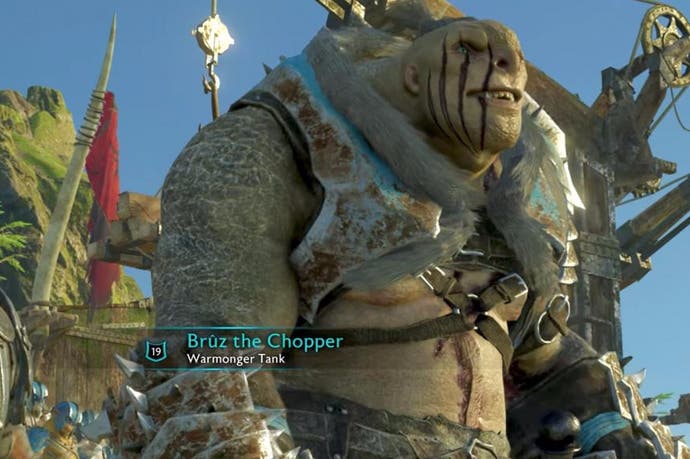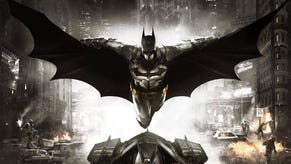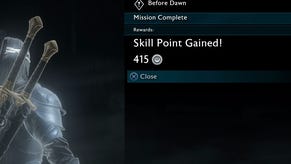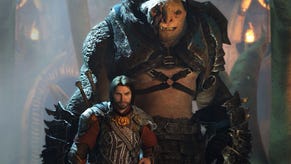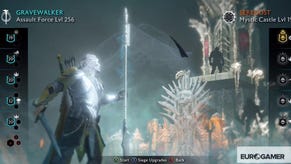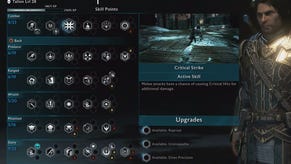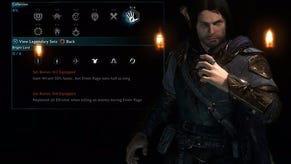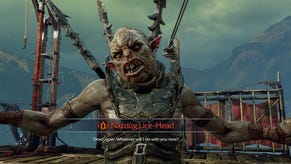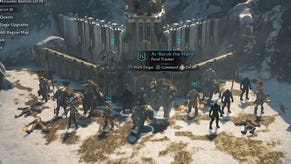Shadow of War's Nemesis system may work some of its greatest magic in your head
Ranger things.
The great thing about Tolkien's Middle-Earth, I reckon, is that it's bigger than a book, bigger than a movie screen, bigger than any collection of words or images you could ever arrange. Middle-Earth has rules that cannot be broken and it has borders that cannot easily be expanded, but those are paltry restrictions when countered by the imagination of a besotted fan. You can think about Middle-Earth forever, because you can just add details and questions and guesswork and hopes and dreams. Fandom this rich is a tunnel leading deep into the misty, cavernous spaces underground - and Tolkien, as we all know, had things to say about those kinds of spaces.
There is a neat parallel here, I think: a parallel with Middle-Earth: Shadow of War and its forerunner, Shadow of Mordor. Many people have told me that Monolith's Middle-Earth games are not terribly faithful to Tolkien, and I don't think they're purely talking about the way these games avoid so many of the characters from The Lord of the Rings, or the way they play fast and loose elsewhere, turning Shelob from a huge spider lurking in the pits into a huge spider who is also, intermittently, a statuesque English lady in a fancy evening dress. They're talking about the tone of the thing: in Tolkien's delicate, if roomy, china shop of lore, Monolith's games are a bit too freewheeling, a bit too chaotic. Tolkien is fun, but it's often a stoical, orderly kind of fun. Monolith's offering too much of a lark.
But what powers the larkiness? The engine of so much of the fun Monolith's offering is the Nemesis system. This is a way of pitting the player against an entire orc society rather than a muddle of disconnected baddies. Beneath the cut-scenes and the loot boxes, Middle-Earth games are brawlers, really: you go out to hit people, you uncover more of the map so you can find more people to hit, and after all that hitting people you're rewarded with things that allow you to hit people in different ways. But the Nemesis system takes all that and says: fine, but what about the people you're hitting? What do they make of things?
So the Nemesis system tracks what you're doing. Kill an orc and another is slid into its vacant position. Die to an orc and the orc that offed you will grow stronger and might get a promotion. It's you against a hierarchy, and the Nemesis system encourages you to muddle around in the org chart. (Or orc chart! Ha ha!) You sneak around looking for intel that will fill in the gaps in your understanding of orc headliners: what a particular baddy is afraid of, for example, or what they're immune to. It allows what might be a repetitive game to become a wonderfully chuggy pleasure: there is a corrugated kind of grind on offer here as you alternate between learning, killing, and dying - at which point the whole system skips forward and becomes more complex in ways that require more learning, more killing, and yet more dying.
And the more I play of this, the more I explore of Middle-Earth, graduating from the happy accident that was Shadow of Mordor to the sprawling, lavish mega-game that is Shadow of War, the more I try to ignore the blandishments of the plot - help us, Ranger! - and the helicopter-parenting of the UI? Well, the more I explore the good stuff, the more I ignore the bad stuff, the more obvious it becomes that the Nemesis system is bigger than a book, bigger than a movie screen. It's not just inviting your imaginative involvement. It genuinely requires your imaginative involvement if you want to get the best out of it.
The Nemesis system doesn't work purely because it's a framework to keep the action moving, to produce procedural baddies for you to whittle down to toothpicks as you plod through the plot, in other words. The Nemesis system works because it's an idea. And it's an idea I can't really get enough of. It works a magic in this game - and it works most of it, I think, in the mind of the player.
There are a handful of things the Nemesis system does in this regard that seem particularly brilliant. Firstly, as it tells you that there is political thought ticking away beneath the hordes you chew through, it is also telling you that you matter. Here is this orc machine, this mass of seething, organised baddies, and you are making life hard for them with every captain you take down, with every archer you dominate. It is lovely to whack away at enemies in a game, but how much better is it to do all this while enjoying the smug feeling that you are a genuine thorn in someone's side, that as you peer into the game, the game is peering back at you and getting frustrated with your brilliance? I am a sucker for attention and praise, I guess, and I'll take it even from a game. I loved the bits in Titanfall 2 when every soldier I met kept telling me how skilfully I was piloting my big stompy robot, even if I knew, in my heart, that I was below average at best. Middle-Earth's trick is even better. Look how much I must be driving all these villains mad! Even when I'm not gathering an army and throwing it at an enemy fort, there is a powerful sense - some of it imagined, no doubt - that the entire game is watching my heroics and reacting to my ingenious gambits.
On top of that, Nemesis makes the Middle-Earth games feel alive. Wonderfully, comically, teeteringly alive. Frustratingly alive? Never! By telling you that so much of the adventure is driven by Nemesis-driven cause and effect, you may find that you're far more willing to put up with the kind of chaos that unfolds on the battlefield.
That chaos! Shadow of War in particular is just brilliant when it comes to violent emergent comedy - when it comes to one fight spiralling into three or four because wandering captains keep turning up, say. This would normally feel unfair, or at least unbalanced. Here you just shrug and get on with it. Shadow of War is just brilliant when it comes to getting distracted in a fight and having an AI character take all the glory, too. Baranor? Stately, proud, helpful, and such an attention-seeker, it turns out. I lost track of how many times I went into a decisive battle in the game's first act only to be informed, seconds later, that Baranor had been the decisive one this time and that the orc I was so eager to get revenge on had already been decapitated by the guest star I had invited along. Quite the orc-hog, Baranor, and this should be annoying. But with Nemesis whirring all about us it feels like par for the course. Shadow of War finds real joy in the simple act of missing the main event, in turning up for a fight only to discover that everybody has accidentally set themselves on fire ahead of your arrival.
All that, and the Nemesis system also often has a face. And with it, of course, the crucial feeling that, just maybe, you're the only person who will get to see this particular face. To put this another way, my favourite character in all of Tolkien is Mozu the Singer. You know, the wiry orc who turns up with a guitar. The guitar has spikes because Mozu uses it to hit people, but he also uses it, well, as a guitar. In between hitting people he often telegraphs his next move though gloriously tuneless orc song. You know he's going to attack because he sings: "Attack, attack, the singer will attttaaaaack!" Questionable tactics, I suspect, but you've got to love the showmanship.
I know that Tolkien never conceived of Mozu himself, but in Shadow of War I allow myself the improbable belief that he is someone only I get to see. Mozu is mine! I have decided not to go online, to seek out the wikis and discover that every Shadow of War disk has its own Mozu waiting patiently, because maybe Nemesis has conjured him for me and me alone. (It hasn't.)
Either way, Mozu gets to the heart of Shadow of War's chaotic fun. He is so clearly the product of a game that circles Tolkien's world in an increasingly eccentric orbit. That's probably the best way to think of Monolith's Middle-Earth games, I reckon: they're not the moon, pacing past in a neat tide-locked rotation. They're more like Pluto, skittish and wonky, doing their own thing out where nobody can tell them otherwise.
